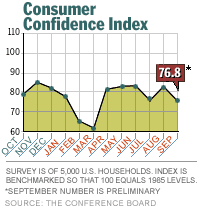NEW YORK (CNN/Money) -
Americans feel pretty lousy, if you believe most consumer confidence surveys, but they're apparently drowning their sorrows at the local mall, real-estate office and auto dealer, meaning the economic impact of their gloom has been minimal.
But some economists worry there will someday be a payback for consumers' all but oblivious spending spree.

While the economy may have grown at the fastest pace in four years in the third quarter, and stock prices finally broke out of their long slump this year, consumer confidence remains tepid at best, if you believe all the surveys.
The University of Michigan's consumer sentiment index rose a smidgen in October, Reuters reported Friday, but only back to its August level. Other surveys, including those from ABC/Money and the Conference Board, a New York research firm, have shown a similar reluctance on the part of consumers to break out the champagne, despite rosy economic forecasts.
A stagnant labor market is the most obvious reason for their wariness -- economists keep talking about how the latest recession ended in November 2001, but more than a million jobs have been lost since then. Some recovery.
"To see a marked improvement in consumer confidence, a sustained recovery in the labor market is a necessary condition," said BNP Paribas economist Alexandra Estiot.
Despite forecasts of steady economic growth in 2003 and 2004, economists doubt the unemployment rate will fall much below its current level of 6.1 percent, as productivity gains, along with a growing exodus of jobs overseas and other factors, could mean a U.S. hiring boom is still a long way away.
Some economists worry that, without much of a pick-up in job prospects, consumers will be reluctant to go on many spending sprees.
"We boosted economic growth in one quarter, but that doesn't mean it's sustainable," said Delos Smith, senior economist at the Conference Board. "We still have a long-range view that the economy is changing, and consumers will have to adjust to it."
Nervous but spending
Economists keep a close eye on consumers, whose spending makes up more than two-thirds of total gross domestic product (GDP), the broadest measure of the economy.
But in the short run, at least, worries about machines replacing workers and jobs moving offshore have had little or no apparent impact on the economy. Quite the opposite has happened, in fact: as consumers have grown more worried, they've actually spent more.
| Related stories
|

|
|
|
|
Boosted by child tax credit checks and cash from mortgage refinancings, the pace of consumer-spending growth may have surged to an annualized rate of more than 6 percent in the third quarter, compared with 3.8 percent in the second quarter, many economists believe.
Meanwhile, automobile sales are likely to top 16 million units again for the fifth straight year, according to the National Automobile Dealers Association, boosted by dealer incentives such as zero-percent financing.
And the housing market continues to be a pillar of strength in the economy; the Commerce Department said Friday that new-home construction was at its second-fastest pace of the year in September, despite a run-up in mortgage rates.
"People don't seem to be so concerned that they're unwilling to commit future income to such purchases," said David Resler, chief economist at Nomura Securities. "The fact that people are willing to do that speaks much louder about consumer attitudes than what they tell some survey," he added.
Payback time?
But there's also little doubt that wage growth has slowed in recent years, as employees have less bargaining power -- witness the recent labor agreements between the United Auto Workers union and Ford (F: Research, Estimates) and General Motors (GM: Research, Estimates) that allowed for nearly a dozen plant closings and thousands of job cuts.
And Cambridge Credit Counseling Corp. recently said it surveyed about 1,000 homes and found that consumers are reluctant to take on debt because of lingering worries about the job market -- though consumers have also shown plenty of willingness in recent years to take on debt, no matter how lousy the labor market was.
In any event, some economists worry that, having gone further in debt to buy new cars, houses and refrigerators earlier this year, there will be little pent-up demand for such items in coming quarters.
In a recent research note, Morgan Stanley chief economist Stephen Roach noted there have been 16 quarters since 1960 in which spending on such "consumer durables" was as big as it was in the third quarter of 2003. In every instance, there's been a big payback in the two quarters that followed.
"To the extent such a payback is likely after the current spending burst, it could act as a sharp depressant on overall demand growth in subsequent quarters," Roach said. "That development, in the context of a lingering jobless recovery, could raise serious questions about the staying power of America's current cyclical resurgence."

|

